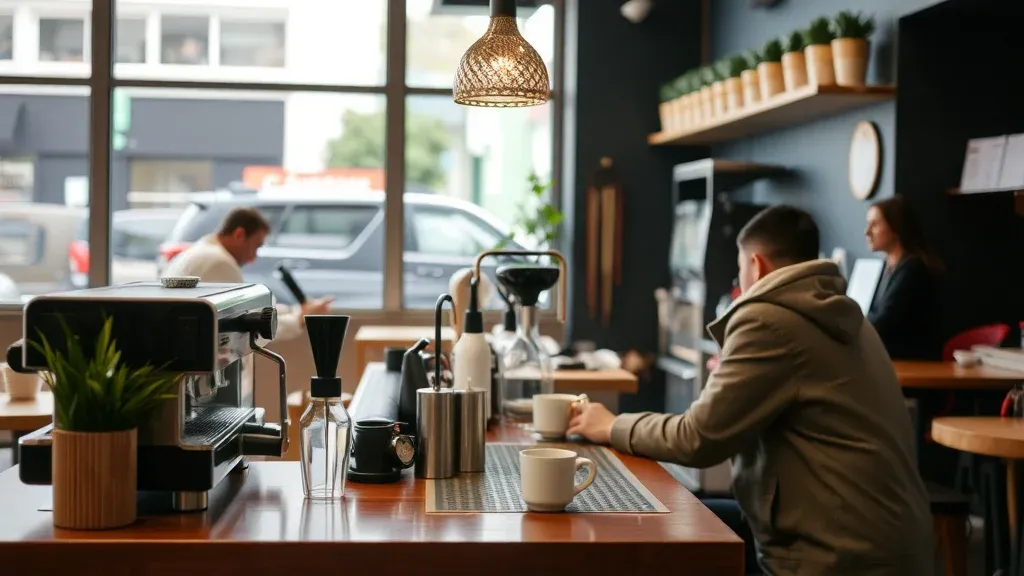What Questions Help Me Confirm Café Cleanliness?
When visiting a café, cleanliness is one of the most important factors that can affect your experience. A clean café not only ensures your health and safety but also reflects the establishment’s attention to quality and hospitality. To help you confirm café cleanliness, here are key questions you should consider asking or observing during your visit.
1. What are the visible cleanliness indicators?
As you enter a café, take note of the following:
- Are the floors clean and free of debris?
- How does the seating area look? Are the tables wiped down and clutter-free?
- Is there a noticeable odor? Freshness is an indicator of regular cleaning.
Observing these elements can give you a quick sense of the café’s overall cleanliness.
2. How often are surfaces cleaned?
A clean space doesn’t happen by accident. Ask the staff about their cleaning frequency for high-contact surfaces:
- How often are tables and chairs disinfected? (Every hour, after every customer, etc.)
- What is the cleaning schedule for restrooms?
- When were the floors last mopped?
Regular maintenance shows that the café values hygiene.
3. What type of cleaning products do you use?
The effectiveness of the cleaning products used can also impact cleanliness:
- Are the cleaning agents eco-friendly and non-toxic?
- Do you use disinfectant sprays or wipes on surfaces?
Understanding the products used can give you peace of mind regarding safety.
4. Are kitchen procedures visible?
If you can see the kitchen area, pay attention to how it looks. You might ask or observe:
- Is the kitchen area organized and clean?
- How do chefs and staff handle food safety? (Are they wearing gloves, hair nets, etc.?)
- Do they follow safe food storage practices?
Clean kitchens generally mean better food safety standards.
5. How is waste managed?
Proper waste management is vital for cleanliness:
- Are trash bins easily accessible and frequently emptied?
- Is recyclable waste separated appropriately?
Effective waste management reflects overall discipline and hygiene practices.
6. What do health inspection reports say?
Health regulations and scores can provide essential insights:
- Does the café display its health inspection score?
- Can they share their latest health inspection report with you?
A high health score indicates that the café adheres to food safety standards.
7. What are customer reviews saying?
Before visiting, check online reviews as they often include comments on cleanliness:
- What do customers say about the café’s cleanliness on review sites?
- Are there recurring mentions of cleanliness or health-related issues?
Checking online reviews from platforms like Yelp or TripAdvisor can provide additional insights.
8. Have you received any complaints about cleanliness?
Speak openly with café staff about customer feedback. This may include questions like:
- Have patrons voiced concerns about cleanliness recently?
- How have you addressed any cleanliness complaints in the past?
Reliable establishments will be transparent about their practices and feedback they receive.
9. Are staff members trained in hygiene?
It’s essential for staff to be knowledgeable about hygienic practices:
- Are crew members trained in proper cleaning protocols?
- Do you have regular refresher courses on hygiene for employees?
Well-trained staff are likely to lead to a cleaner environment.
By asking these questions and observing the café environment, you can make informed decisions about where to enjoy your coffee or pastry. Prioritizing cleanliness not only enhances your experience but also fosters a community of health-conscious cafés. For more detailed guidelines, visit the FDA for hygiene and safety regulations in food establishments.
The Importance of Cleanliness in Cafés for Customer Satisfaction
When you walk into a café, the first thing that often catches your eye is its cleanliness. It’s not just about aesthetics; it’s a critical factor that impacts customer satisfaction. Cleanliness in cafés doesn’t just foster a good impression, it contributes to the overall experience, encouraging customers to return and recommend the place to others.
One of the primary reasons cleanliness is essential is health and safety. Customers expect cafés to adhere to hygiene standards. A clean environment minimizes the risk of foodborne illnesses, a concern for many diners. Regular cleaning practices in kitchens and dining areas help ensure that customers feel safe while enjoying their meals.
Here are some critical questions you can ask to confirm the cleanliness of a café:
- Are the tables and chairs clean? Check if the surfaces are wiped down regularly and free from sticky residue or crumbs.
- Are the floors clean? Look for signs of dirt or spills on the floor. A cafe with clean floors showcases attention to detail.
- Is the restroom maintained? A dirty restroom is often a reflection of the overall hygiene of the establishment. Ensure that it is regularly stocked with soap and paper towels, and is well-maintained.
- Are staff members following hygiene protocols? Observe if the staff wear clean uniforms and practice proper handwashing between tasks.
- Are the food preparation areas clean? If possible, look at the kitchen from the customer area. A tidy kitchen usually suggests good practices.
Beyond health concerns, a clean café enhances customer comfort. Customers want to feel at ease and enjoy their food without distractions. A clean, organized space fosters a welcoming atmosphere. When patrons see that the place is well-kept, it creates a sense of trust and comfort. This directly ties into customer satisfaction, leading to repeat visits. It’s no surprise that a dirty café can repel customers even if the food is extraordinary!
Another aspect to consider is how cleanliness influences a café’s reputation. Social media today allows for instant sharing of experiences. A single review highlighting cleanliness or the lack thereof can sway potential customers. According to recent surveys, around 70% of individuals check online reviews before visiting a café. Establishments that prioritize cleanliness tend to receive positive feedback, which is crucial in a competitive market.
Customer satisfaction can also significantly impact a café’s bottom line. A study revealed that customers are willing to pay more for food and beverages in a clean environment. This means that investing in hygiene not only pays off in terms of customer satisfaction but also boosts revenue. Cleanliness indicates professionalism and care, important qualities to establish customer loyalty.
In addition, you can regularly evaluate cleanliness by receiving feedback from customers. Encourage patrons to share their thoughts on hygiene through comment cards or digital surveys. This feedback not only provides insight but also engages customers, making them feel valued. Adapting to their needs showcases the café’s commitment to maintaining high standards.
To achieve higher cleanliness standards, employees should undergo regular training sessions. Staff should be educated on the importance of hygiene, proper cleaning techniques, and the protocols for maintaining a sanitary environment. Regular audits can help identify areas for improvement, ensuring that the café continues to meet cleanliness benchmarks.
It’s vital for café owners to invest in quality cleaning supplies and equipment. The right tools make a significant difference in how effectively a café can maintain a clean environment. From sanitizers to mops, quality equipment can ease staff workloads and ensure thorough cleaning practices.
For more information on cleanliness standards, you can refer to these resources: FoodSafety.gov and OSHA. These websites offer guidelines and regulations that can help cafés maintain proper hygiene standards.
Ultimately, the cleanliness of a café is directly linked to customer satisfaction. By prioritizing hygiene, café owners can create a positive dining experience that retains customers and enhances their reputation. Cleanliness might seem simple, but its impact on a café’s success is profound.
How to Spot Signs of a Well-Maintained Café
When visiting a café, we often focus on the menu and ambiance, but café cleanliness is equally important. You want to ensure that the place where you’re grabbing your coffee or snack is both inviting and hygienic. Knowing what to look for can help you confirm that a café is well-maintained. Here are some key questions you can ask yourself while assessing a café’s cleanliness:
Does the exterior look inviting?
The first impression starts outside. Pay attention to the following:
- Windows: Are they clean and smudge-free?
- Patio or entrance: Is the area tidy and free from litter?
- Signs: Are the café signs visible and well-maintained?
How is the interior upkeep?
The interior reflects the café’s overall cleanliness. Look around for these signs:
- Floors: Are they swept and free from crumbs and spills?
- Tables and chairs: Are they clean and properly arranged?
- Restrooms: What is their condition? Clean restrooms often reflect a well-maintained café.
Are the staff following proper hygiene practices?
Observe how the staff behaves. This can tell you a lot about the café’s cleanliness culture:
- Uniforms: Are they wearing clean uniforms?
- Hand Hygiene: Are employees washing their hands before handling food?
- Food Preparation: Is there visible attention to hygiene when they handle food?
Is there a cleanliness policy displayed?
Some cafés take pride in their maintenance and make it known. Check for:
- Health Inspections: Is there a certificate displayed?
- Cleaning Schedule: Are the cleaning procedures posted for customers to see?
How is food and drink presentation?
The way food and drinks are served can be a good indicator of overall cleanliness:
- Packaging: Is the packaging of food items clean and undamaged?
- Utensils: Are they sanitized and properly stored?
What about the kitchen area?
If you can see the kitchen or food prep area, take note:
- Organization: Is it tidy and well-organized?
- Appliance condition: Are appliances cleaned and maintained?
Are there pest control measures in place?
Pests can indicate a cleanliness issue. Look for:
- Traps and bait stations: Are they discreetly placed and well-maintained?
- Signs of pests: No evidence of insects or vermin should be visible.
Customer Feedback
Don’t hesitate to ask regular customers about their experiences. Online reviews can also provide useful insights. Websites like Yelp can show you recent ratings and comments that mention cleanliness.
Your health and enjoyment come first. If the café doesn’t seem clean following these observations, it’s worth considering another place. Cleanliness not only contributes to a better experience but also indicates that the café prioritizes the health and safety of its customers. Always pay attention, and don’t hesitate to trust your instincts. Happy café hopping!
Common Sanitation Practices to Look For in Your Local Café
When you step into a café, your health and safety should be paramount. Understanding the sanitation practices that ensure cleanliness can enhance your experience. Here’s what you should look out for during your visit.
Exterior Sanitation
The first impression often sets the tone for your visit. Pay attention to the cleanliness of the café’s exterior.
- Sidewalk and Entrance: Are the pathways leading to the café clean and well-maintained? A tidy entrance indicates that the café values cleanliness.
- Trash Disposal: Look for proper disposal methods. Are the trash bins emptied regularly and placed correctly?
Employee Hygiene
The staff’s hygiene practices directly affect café cleanliness. Observe how employees manage their personal cleanliness.
- Uniforms: Are employees wearing clean, appropriate uniforms? A neat appearance is a positive sign of their commitment to hygiene.
- Hand Washing: Check if staff wash their hands frequently and properly, especially after handling money or food.
Food Handling and Preparation Areas
Inspecting behind the scenes can be revealing. If you have the opportunity to observe food prep areas, take note of the following:
- Workspace Cleanliness: Are surfaces clean and free from debris? A well-sanitized station protects both food and diners.
- Equipment Maintenance: Ensure the coffee machines, blenders, and ovens are clean and functioning properly.
Restroom Sanitation
Restrooms are crucial to a café’s overall hygiene. Here’s what to check:
- Regular Cleaning: Look for evidence of frequent cleanings, like available supplies and sanitation logs.
- Soap and Towel Access: Ensure there is ample soap and disposable towels for drying hands.
Table and Dining Area Cleanliness
Your immediate environment also matters. When seated, consider the following:
- Table Condition: Is your table and chair clean? Dirty surfaces can harbor germs.
- Floor Cleanliness: A tidy floor signals that the café takes its overall cleanliness seriously.
Safety Practices
In addition to regular cleaning, some cafés adopt specific safety practices:
- Daily Cleaning Schedule: Cafés should have routines for cleaning high-touch areas, such as menus, condiments, and tables.
- Employee Training: A well-trained staff understands the importance of sanitation and follows best practices.
Health Certifications
As a customer, ensuring that a café complies with health regulations is essential.
- Health Permits: Look for posted health inspection scores or permits. These documents provide information about the café’s compliance with health standards.
- Food Safety Training: Check whether employees have relevant food safety qualifications or training, ensuring adherence to hygiene protocols.
By asking the right questions and observing these practices, you can ensure a safe and enjoyable café visit. Remember, a clean café not only enhances your experience but also assures you of your health and well-being. Pay attention to these indicators as they reflect the care taken by the establishment to maintain high sanitation standards.
For more in-depth information regarding café cleanliness standards and best practices, you can visit resources like CDC Food Safety or USDA Food Safety and Inspection Service.
Next time you’re in your local café, keep these sanitation practices in mind. A little awareness can go a long way in keeping you safe and healthy while enjoying your favorite beverages and snacks.
Evaluating Café Cleanliness: Key Areas to Inspect
When you enter a café, the first thing you notice is the ambiance, but underlying this experience is an equally important factor: cleanliness. Ensuring a café is clean is crucial for both customer satisfaction and health standards. To help you evaluate the cleanliness of a café effectively, here are some essential areas to inspect and corresponding questions to consider.
Ambiance and General Environment
Evaluate how the café feels overall. Is it welcoming? A clean environment should provide a sense of safety and comfort. Ask yourself:
- Are the floors clean and free of debris?
- Do the tables and chairs look wiped down and sanitized?
- Is the air fresh, or is there an unpleasant odor?
Food Preparation Area
The food preparation area is one of the critical zones in a café that needs thorough inspection. It’s essential to ensure that food is prepared safely to prevent contamination. Ask these questions:
- Is the kitchen area visible to customers, and does it appear organized?
- Are food items stored correctly and off the floor?
- Is there a clear separation between raw and cooked foods?
Restroom Facilities
A café’s restroom is an important indicator of overall cleanliness. A tidy restroom reflects a café’s commitment to hygiene. Evaluate the restrooms by considering:
- Are the restrooms stocked with soap and paper towels?
- Is there a pleasant smell, and are the surfaces clean?
- Does the café employ regular restroom checks throughout the day?
Staff Hygiene
The hygiene of café staff is essential in maintaining a clean environment. Notice the following aspects about staff behavior and appearance:
- Are staff members wearing clean uniforms?
- Are employees washing their hands regularly, especially after handling food?
- Do they appear knowledgeable about health and safety practices?
Maintenance of Equipment
Equipment maintenance is crucial for both cleanliness and operational efficiency. Inspect the following:
- Are coffee machines and other equipment clean and well-maintained?
- Is there evidence of regular servicing for kitchen appliances?
- Are garbage disposal systems being utilized properly and emptied regularly?
Tables and Seating Area
Customers spend a significant amount of time in the seating area, making it essential to keep this area clean and inviting. Consider the following:
- Are the tables wiped down after each customer exits?
- Are the upholstery and cushions clean and free from stains?
- Do the customers have enough space between tables for comfort and privacy?
While evaluating café cleanliness, remember that communication is key. If you notice something that doesn’t meet your standards, don’t hesitate to bring it up with the staff. Most establishments value feedback and will appreciate the opportunity to improve.
Resources for Further Insights
For more information on café cleanliness standards and health regulations, you can check out the following resources:
Evaluating a café’s cleanliness involves a detailed inspection across various areas, from food preparation to restrooms and staff hygiene. By asking the right questions and observing carefully, you can ensure that you enjoy not only a great cup of coffee but also a clean and safe environment. Remember that cleanliness speaks volumes about a café’s commitment to its customers, enhancing your overall experience.
The Role of Café Staff Training in Maintaining Hygiene Standards
Maintaining hygiene standards in cafés is essential for customer satisfaction and health safety. A significant factor in achieving this is proper training for café staff. Effective training equips employees with the knowledge and skills necessary to uphold cleanliness and sanitation protocols. When staff members are well-trained, there is a noticeable reduction in health risks, leading to a safer and more inviting café environment.
One critical area of staff training revolves around understanding the importance of personal hygiene. Employees must learn the fundamentals of handwashing, skin care, and appropriate dress codes. Regular handwashing is crucial, especially after handling food and using the restroom. Staff should ask themselves:
- Do I wash my hands frequently and properly?
- Am I using gloves when necessary, and are these gloves changed regularly?
- Am I wearing clean uniforms or aprons during service?
In addition to personal hygiene, it is vital for café staff to comprehend the significance of cleaning and sanitizing food preparation areas and customer-facing surfaces. Staff should recognize which areas require more attention and the best practices for cleaning these spaces. Addressing frequently touched surfaces such as menus, tables, and countertops can reduce the spread of germs. Key questions for staff training in this area include:
- Do I know the proper cleaning agents for various surfaces?
- How do I maintain cleaning schedules for different areas?
- Am I aware of the cleaning procedures for utensils and equipment?
Moreover, awareness of food safety regulations is crucial in a café environment. Completing training in food safety can help staff avoid cross-contamination and manage food storage effectively. Some pivotal questions in this regard might be:
- Do I know the correct temperatures for cooking and storing different types of food?
- How do I ensure that raw and cooked foods are separated?
- What steps do I take when dealing with expired or spoiled food items?
Effective training programs can also introduce practices like regular sanitation audits. Staff should be involved in these audits to reinforce their learning and accountability. Having a checklist can streamline this process. Below is a sample checklist that could be adapted:
| Area | Frequency | Completed (Yes/No) |
|---|---|---|
| Handwashing Stations | Daily | |
| Food Prep Surfaces | Every 2 hours | |
| Menus and Tables | After each customer | |
| Utensils and Kitchen Equipment | Daily |
Moreover, continual refresher courses can reinforce these training modules. Regular training not only enhances hygiene standards but also keeps staff motivated about their roles in maintaining café cleanliness. As staff members revisit training scenarios, they can improve their response to hygiene-related challenges.
Collaboration with industry partners for training resources is also beneficial. Utilizing platforms like the ServSafe program offers comprehensive training materials that cover a range of hygiene topics vital for café operations. This can serve as an invaluable resource for staff development.
Café staff training plays a pivotal role in maintaining hygiene standards. By focusing on personal hygiene, cleaning practices, food safety regulations, and regular assessments, cafés can create a welcoming environment for customers. Ultimately, a well-trained staff not only ensures hygiene excellence but also enhances the overall customer experience. By engaging staff and regularly updating training programs, café owners can significantly improve hygiene practices and promote public health.
Customer Feedback: A Tool for Assessing Café Cleanliness
When visiting a café, the first impression often hinges on cleanliness. A tidy environment not only enhances the overall experience but also reflects a café’s commitment to food safety and customer care. Leveraging customer feedback is an invaluable way to gauge cleanliness standards. There are specific questions you can consider to assess how well a café is maintaining its hygiene. These inquiries help clarify the perception of cleanliness from the customer’s viewpoint.
Questions to Evaluate Cleanliness Through Feedback
To understand customer perceptions regarding café cleanliness, here are some crucial questions to ask:
- How clean did you find the interior of the café? This question helps gauge the overall tidiness of the café, including tables, floors, and seating arrangements. Customer responses can reveal areas needing attention.
- Were the restrooms adequately maintained? A café’s restrooms are often a reflection of its cleanliness. If customers report ongoing issues, it could indicate a neglect that needs swift addressing.
- Did you notice any unpleasant odors? Smells can be a significant indicator of poor cleanliness. If patrons comment about odors, it may be wise to investigate ventilation and cleaning routines.
- Were the food preparation areas visible and clean? Transparency in food prep areas is crucial. Customers should feel assured that their food is being made in a clean space.
- How was the cleanliness of the menus and condiments? Items that patrons handle often should be regularly sanitized. This question sheds light on how frequently these items are cleaned and replaced.
- Was the outdoor seating area clean? For cafés with patio or outdoor spaces, cleanliness extends to these areas as well. Feedback here is essential for a comprehensive cleanliness assessment.
Analyzing Feedback
Once you gather customer feedback, analyzing it can reveal trends and areas for improvement. Here are some essential aspects to review:
- Frequency of Cleanliness Complaints: Monitor how often cleanliness is mentioned in reviews. A pattern may indicate a systemic issue that requires immediate attention.
- Specific Locations of Concern: Identify any particular area (like restrooms or the dining room) that consistently receives negative feedback.
- Suggestions from Customers: Pay attention to customer recommendations. Often, customers may suggest practical solutions that can quickly enhance the cleanliness of the café.
Implementing Changes Based on Feedback
Addressing concerns raised through customer feedback is essential for any café owner. Here’s how to effectively implement changes:
- Set Up Regular Cleaning Schedules: Establishing a cleaning routine ensures every part of the café is regularly maintained.
- Train Staff on Importance of Cleanliness: Educating employees about hygiene practices helps maintain high cleanliness standards.
- Conduct Regular Audits: Periodic cleanliness audits can help identify problem areas before customers do.
Utilizing Online Reviews
In today’s digital age, online reviews are vital. Encourage customers to share their experiences on platforms like Yelp, Google Reviews, and TripAdvisor. Not only does this give you valuable insights, but it also improves your online visibility, which can attract more customers.
For instance, customers may voice specific concerns about your café’s cleanliness in their reviews. Regularly monitor these platforms to address negative comments and improve your café’s reputation.
Resources for Cleanliness Standards
There are several resources available to help you maintain and improve cleanliness in your café. Check out:
- FoodSafety.gov for guidelines on food safety and cleanliness
- CDC Handwashing Guidelines for best practices.
- Nation’s Restaurant News for trends and insights in the restaurant industry.
By consistently seeking customer feedback regarding cleanliness, you not only elevate your café’s standards but also foster a sense of trust and satisfaction among your patrons. Maintaining a clean environment will enhance your café’s reputation and encourage repeat visits.
Key Takeaway:
Key Takeaway: Ensuring Cleanliness in Cafés is Crucial for Customer Satisfaction
When visiting a café, cleanliness should be at the forefront of your mind as a discerning customer. The questions you ask can significantly influence your experience and offer peace of mind about the establishment’s hygiene standards. For instance, inquire about how frequently tables and counters are cleaned, or whether staff members wash their hands regularly. These straightforward yet essential questions lay the groundwork for assessing the level of cleanliness.
Cleanliness in cafés directly impacts customer satisfaction. A spotlessly maintained café instills confidence in patrons, encouraging them to return. Customers are more likely to enjoy their meals and beverages in a space that feels fresh and inviting. If you experience a dirty table or notice unkempt areas, it can tarnish your impression of the entire café, often leading to negative reviews or decisions not to return.
When evaluating a café’s cleanliness, look for specific signs of maintenance. Are the floors free of debris? Is the restroom kept in a sanitary condition? Observing these key areas can help you gauge the level of care the café takes in its operations. Common sanitation practices include regular cleaning of surfaces, proper food handling, and mandatory staff training on hygiene protocols. Cafés that uphold high standards typically have trained personnel who understand the importance of cleanliness, ensuring that your dining experience remains as enjoyable as possible.
Additionally, customer feedback serves as a useful tool for assessing cleanliness. Pay attention to online reviews or comments from fellow patrons regarding the hygiene of a café. This collective insight not only aids you in making informed decisions, but it also drives café owners to maintain or improve their sanitation standards based on customer expectations.
Prioritizing questions about café cleanliness while paying attention to crucial signs of hygiene can significantly enhance your overall café experience. After all, a clean café is not just an expectation—it’s a foundation for customer satisfaction and loyalty. By being mindful of these factors, you contribute to a culture of cleanliness that benefits everyone.
Conclusion
Ensuring that a café maintains high cleanliness standards is crucial for both customer satisfaction and health safety. By asking the right questions, you can gauge the level of hygiene in your favorite café. Cleanliness directly impacts the dining experience, as a well-maintained space reflects a commitment to quality that customers appreciate.
When visiting a café, look out for key indicators of cleanliness such as spotless surfaces, organized menus, and cleanliness in food preparation areas. These elements not only enhance the ambiance but also assure you that the café prioritizes hygiene. Familiarizing yourself with common sanitation practices—like regular cleaning schedules and proper waste disposal—can provide you with additional insights into a café’s operations.
Evaluating areas such as restrooms, seating, and food preparation stations can further affirm a café’s commitment to hygiene. Additionally, well-trained café staff who adhere to hygiene protocols play a significant role in creating a safe dining environment. Their knowledge and attention to detail can often make a noticeable difference.
Customer feedback serves as a critical tool in assessing cleanliness. Reviews and ratings can offer you a well-rounded view of other patrons’ experiences, enabling you to make informed choices. By actively engaging with these elements, you not only protect your well-being but also support establishments that value cleanliness, ultimately enhancing the café culture in your community. When you choose to support clean cafés, you contribute to a healthier and more enjoyable dining experience for everyone.




